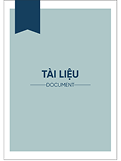Ấn phẩm
Modelling the synergy between fiscal incentives and foreign direct investment in Ghana

Xem mô tả
151
Xem & Tải
3
Nhan đề khác
Tóm tắt
Purpose – The purpose of the paper was to investigate the role of fiscal incentives in driving foreign direct investment (FDI) inflows into the Ghanaian economy based on data from 1975 to 2017 with the Eclectic paradigm as the theoretical basis. FDI inflows was the dependent variable whiles trade openness, corporate tax rate, exchange rate and market size were the independent variables with corporate tax rate as the main explanatory variable of interest. Design/methodology/approach – The autoregressive distributed lag (ARDL) bounds test technique was employed to investigate Cointegration in the model. The results showed the presence of cointegration among the variables. Findings – The results revealed that corporate tax rates have a significant negative impact on FDI inflows into the Ghanaian economy in the long run and significant positive impact on FDI inflows in the short run. In the context of Ghana, the positive short-run relationship observed is attributed to the lag effect of tax policy on FDI inflows. Research limitations/implications – One obvious limitation of the research is that, it does not identify the specific foreign businesses that are more deserving of a low corporate rate and to what extent can that boost FDI inflows in Ghana. Another limitation is that the data analyzed in the paper is exclusively for Ghana and the findings may not be generalized for other countries. Practical implications – Based on the research findings, it is recommended that the Ghana Revenue Service (GRA) restructures the corporate tax regime in the country to deal with the policy lapses. It is also recommended that low corporate rates should be maintained especially in respect of foreign companies that are into the production of goods and services for which indigenous companies in Ghana have a comparative disadvantage in order to drive FDI into the Ghanaian economy. Originality/value – This paper is unique for providing up to date and dynamic insights into the tax incentive and FDI nexus in the Ghanaian context.
Mô tả
Economic Investment
Tác giả
Adamu Braimah Abille
Tác giả khác
Desmond Mbe-Nyire Mpuure
Ibrahim Yahaya Wuni
Peter Dadzie
Người hướng dẫn
Nơi xuất bản
Nhà xuất bản
Kinh Tế Quốc Dân
Năm xuất bản
2020
ISSN tạp chí
Nhan đề tập
Từ khóa chủ đề
Fiscal incentives , Foreign direct investment , Short run , Long run , ARDL model , Ghana
